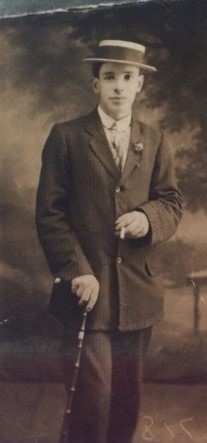GEORGE LEWIS Born in Burry Port 1890
This is the first extract from the unpublished memoirs of George Lewis of Burry Port. They give a fascinating insight into life in the town at the beginning of the 20th century.
Part 1 Memories of schooldays
After we moved to Parkes Street we still attended the only school in Burry Port at that time. It was called Ysgol y Bach-ce. We went there until the new school was built in the village.
I have a very vivid memory of Queen Victoria’s Golden Jubilee in the year 1897. I was then seven years old, and it was a very grand event. All the children had a wonderful tea at the school, and all were presented with commemorative mugs which had the Grand Old Lady’s picture on. These souvenirs were cherished for many years.

We had sports, racing, jumping, in fact all kinds of sports, I was the winner in one race – the prize was a few coppers and a prize bag to hang around my neck, I was a very proud boy that day.
In the evening there were bonfire beacons all over the tops of the local mountains, and we could see them across the estuary on the Gower side. What a wonderful day that was.
I was very found of going to school, where we were never taught a word of Welsh. The English Education Minister decreed against it as he thought speaking Welsh would prevent children from gaining proficiency in the English language. What a injustice and folly this was. Dictatorship of the first order.
Surely the more languages a child learns the better he is equipped. Events have proved so, as Wales has produced the best English speakers that our Parliament has ever heard. Take David Lloyd George for instance, a master in both languages Welsh and English. William Hughes, Prime Minister of Australia, was another great speaker. Owen M Edwards, who became one of Britain’s most famous scholars, was once caned for speaking Welsh.
I was in standard four when I began learning in earnest. It was said that standard four was the most important class in school, and I worked very hard there. Our headmaster was Mr George Phillip Lewis, a gentleman who gained respect from every child. The reason was perhaps he had in his possession a cane, which when necessary he could wield as proficiently as his bat on the cricket field. He was a batsman of some note.
It was a joy to see him on the wicket with his bat seldom in the blockhole but up on his shoulder and his eagle eye on the oncoming ball, scoring runs like the master he was. He was a great cricketer. But it is another story when he had occasion to use the cane on the boys whom he thought deserved it – then not so popular. But more of G.P. later.
Our teacher in standard four we boys nicknamed Dai-la-di-da, a name he carried to the grave. Nearly everyone in those times had a nickname whether they liked it or not, and nicknames stuck. Mine was Georgie Porgy, which sounded worse when the girls said it.
Dai-la-di-da was always immaculate. He was middle aged but very active, and a keen disciplinarian in the class room. When outside he was a very pleasant man.
He had a way of his own to impart knowledge into his pupils, I can honestly say I learned more from him than all the other teachers. When he took us in reading he would shout out: “ Take your time, finish one word before you commence another, raise or lower your voice when required. The comma is a note of interrogation, and pay adequate attention to full stops. You are reading a book not running a race”
And when we were learning English grammar – analysing and parsing lessons – he made it sound so interesting that you looked forward to the next. He was a talented musician who played and taught the piano, and had a taste for good music.
I can remember still the songs of the time he taught us, such as Rule Britannia, Sweet and Low, the British Grenadiers and many more. He instilled music into us, and thus I became very fond of the subject. He certainly taught us the importance of the three R’s, and music as well.
After morning prayers duly held in the main hall we marched military style to our respective class rooms and did not stop marching until the word “Halt” was given. The Boer War was being fought at the time. Our first lesson of the day was mental arithmetic for some 30 minutes or so, I was fond of that and became good at it. My right hand was first up as a rule to show that I knew the answer and I was invariably correct. Decimal, fractions, and equations were taught in class four. Not all teachers had Dai-la-di-da’s gift and that is true today. Learning has had new tags put on it like comprehensive, higher grades, etc., but there is no short cut to learning; thefundamentals must be observed and understood.
We were not so fortunate in our next teacher. He would stand in front of the class, a job to keep his eyes open, his backside to the big coal fire dreaming. He wasn’t himself until play time, when he would come out into the yard and join in our game of rugby. He was very fond of rugby, like most people in Burry Port, there were plenty of things that were scarce, but not rugby. It came next to Chapel, and it was nearly a religion. Even grandfather and grandmother would want to know whether our teams had won or lost.
Although I was learning to read English reasonably well in school, at home and in chapel it was only Welsh. All the games played on the streets and fields were played in Welsh. By 1900 the new school had been built, one entrance for the boys and another for the girls, and a high wall in the playground separating us. The school was much nearer our house in Parkes Street and was much better equipped.
I was fond of school, and never far from the top of the class. Reading, writing, essays and composition and mental arithmetic, and later on more advanced subjects like algebra, geometry and drawing were the chief subjects.
As the years rolled on, we had new experiences. Sanitation was very primitive, and there was no water taps in the houses for either washing or cooking, – all water had to be fetched from the well. All day long people came to the well; it must have been very deep as the water was always cold, summer or winter. It was the meeting place to hear the local gossip and to chat with friends and neighbours, particularly among the young people. Many marriages ensued after meeting at the well. In due course the well was covered and three taps were fixed to the wall of the end house.
This extract appears by courtesy of Shan Oldham, granddaughter of George Lewis.
